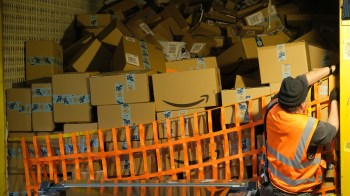The lucrative crime of cardboard theft
Kai Ryssdal: Think about this the next time time you toss a used cardboard box in the recycling pile. That seemingly useless agglomeration of wood pulp is worth something to somebody. Cardboard theft is apparently on the rise. John Metcalfe’s article on the subject for TheAtlanticCities.com is called: “Inside the Suprisingly Lucrative World of Cardboard Theft.” John, good to have you with us.
John Metcalfe: Good to be here.
Ryssdal: So there are a couple of things in the headline of this post that got to us. The first was “cardboard theft,” and the second was “surprisingly lucrative.” Really?
Metcalfe: It’s true. People don’t really think about it at all because it’s seen as garbage, but in New York City — just New York — the people who recycle this material say they are losing $8-10 million each year due to people just ganking their cardboard.
Ryssdal: I’m sorry, “ganking” their cardboard? Is that a word?
Metcalfe: Yeah, just stealing it right off the curb.
Ryssdal: So how does it work? You go into some detail in this piece. It’s more than a one-man opeartion, right?
Metcalfe: Anyone basically who wants to rent a van or a truck can just do that and then drive down, say, Atlantic Ave. in Brooklyn at night and just throw in cardboard in the back of their truck. You can make $1,000 that way in one night.
Ryssdal: If I wanted to do this — needing a break from public radio — I couldn’t actually just go out and do it, right? I’d have to rent that truck, get some guys, and I’d have to line up some place to sell it to, right? There’s a certain amount of enterprise that has to happen here.
Metcalfe: Yeah. I guess when people hear “cardboard theft” they might get a picture in their head of like a homeless guy pushing a shopping cart down the street, and that’s not actually what’s happening. People are organized around this. There are gangs, rings. In I guess the most recent bust, these guys — two from New Jersey, one from Staten Island — were taking cardboard from the loading docks of Wal-Mart in New Jersey. They were just backing their trucks up and pretending to be licensed haulers and no one asks a lot of questions.
Ryssdal: I would imagine that the New York Police Department says it has better things to do with its time than worry about this.
Metcalfe: That’s what the licensed haulers claim. They say that the police are too busy, the attorney’s office does not view this as a significant priority, and even when a thief is arrested and their vehicle’s impounded, the city agencies don’t want to deal with this truck that’s just loaded up with old, musty cardboard.
Ryssdal: How widespread is this? You did the bulk of your reporting, I imagine, in New York. But does it happen in Chicago? Here in L.A.?
Metcalfe: Yeah. It happens everywhere there is cardboard. The word is out. It’s been happening for decades and it’s really gotten bad in the past couple of years because the price of cardboard has gone up. Developing countries like India and China really want this material and so it’s just basically free money lying on the sidewalks.
Ryssdal: Is this going to ever get solved, do you think? Or is it just one of those crimes that just keeps on going?
Metcalfe: Well, I guess going back to New York, it’s happening because the penalties for it are not that big. It’s basically a misdemeanor. You get a notice, a violation, if you’re caught. The New York City Council actually has a bill that it’s debating that would add enhanced criminal penalties to it and that might make a dent in it.
Ryssdal: Does this then trickle down into the regular economy? Do the licensed recyclers then have to raise their prices?
Metcalfe: That’s what they’re claiming. They say that they’re going to have to charge more because they’re not making as much money and that could affect consumers because then the businesses might raise the prices of their groceries or whatever else they’re selling.
Ryssdal: John Metcalfe is a repoter at TheAtlanticCities.com. His piece that we’re talking about is called “Inside the Suprisingly Lucrative World of Cardboard Theft.” John, thanks a lot.
Metcalfe: Thanks a lot.
There’s a lot happening in the world. Through it all, Marketplace is here for you.
You rely on Marketplace to break down the world’s events and tell you how it affects you in a fact-based, approachable way. We rely on your financial support to keep making that possible.
Your donation today powers the independent journalism that you rely on. For just $5/month, you can help sustain Marketplace so we can keep reporting on the things that matter to you.


















